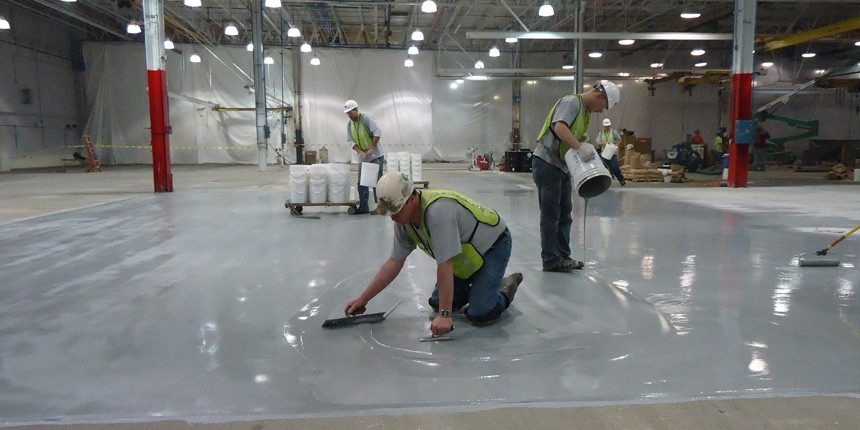Floor coating is a transformative solution that goes beyond merely covering your floors. It’s a protective layer that can enhance the aesthetics of your space while providing durability and longevity to the underlying surface. In this comprehensive guide, we’ll delve into the world of floor coating, exploring its types, benefits, application methods, and maintenance practices.
Definition of Floor Coating
Floor coating, in essence, is a protective layer applied to the surface of a floor. This coating serves multiple purposes, including enhancing the visual appeal, protecting against wear and tear, and ensuring the longevity of the flooring material. From residential homes to industrial settings, floor coatings have become a popular choice for those looking to elevate the functionality and aesthetics of their spaces.
Importance of Quality Floor Coating
Investing in a quality floor coating is not merely about aesthetics. It’s about creating a shield that safeguards the floor from the daily challenges it faces. Whether it’s the foot traffic in your living room or the heavy machinery in an industrial facility, the right floor coating can make a significant difference in the lifespan and performance of your floors.
Types of Floor Coatings
Epoxy Floor Coatings
Epoxy floor coatings are known for their exceptional durability and resistance. Composed of a mixture of resins and hardeners, epoxy coatings create a tough, glossy surface that can withstand heavy use. Ideal for garage floors, commercial spaces, and even residential kitchens, epoxy coatings offer a seamless and attractive solution.
Polyurethane Floor Coatings
Polyurethane floor coatings provide a flexible and protective layer. These coatings are resistant to abrasions, chemicals, and UV exposure, making them suitable for a variety of environments. From healthcare facilities to gymnasiums, polyurethane coatings offer a durable and hygienic solution.
Acrylic Floor Coatings
Acrylic floor coatings are known for their versatility. These coatings can be applied to various surfaces, including concrete and asphalt. They are popular for outdoor applications, offering protection against the elements while maintaining a visually appealing finish. Acrylic coatings are also available in a range of colors, allowing for creative customization.
Benefits of Using Floor Coatings
Improved Aesthetics
One of the primary reasons individuals opt for floor coatings is the significant improvement in aesthetics. The glossy finish of epoxy coatings, the versatility of acrylic options, or the subtle sheen of polyurethane – each type of coating adds a touch of sophistication to the space.
Protection Against Wear and Tear
Beyond aesthetics, floor coatings act as a protective shield against wear and tear. The daily grind of foot traffic, furniture movement, and other activities can take a toll on your floors. Floor coatings, with their high resistance to scratches and stains, ensure that your floors maintain their pristine condition over the long term.
How to Choose the Right Floor Coating
Assessing Surface Material
The type of flooring material you have is a crucial factor in choosing the right floor coating. Whether you have concrete, wood, or tile, each material has its unique characteristics. Understanding the compatibility between the coating and the surface material is essential for a successful and long-lasting application.
Traffic and Usage Considerations
Consider the level of traffic your space experiences. High-traffic areas, such as hallways and entryways, require a more robust and durable coating. On the other hand, low-traffic areas might allow for more flexibility in coating options. Additionally, industrial settings may demand specialized coatings designed to withstand heavy machinery and constant movement.
Budget and Long-Term Investment
While budget considerations are essential, it’s crucial to view floor coating as a long-term investment. Quality coatings may have a higher upfront cost but can save you money in the long run by reducing the need for frequent repairs and replacements. Consider the return on investment (ROI) when making your decision.
DIY Floor Coating vs. Professional Installation
DIY Floor Coating Kits
DIY floor coating kits are available for individuals who prefer a hands-on approach to home improvement. These kits typically include all the necessary materials and instructions for self-application. While they can be cost-effective, it’s essential to weigh the pros and cons, considering factors such as the complexity of the application and the need for specialized tools.
Professional Floor Coating Services
Professional floor coating services offer expertise and precision. Hiring professionals ensures that the coating is applied correctly, adhering to the specific requirements of the chosen product. Professionals can also provide valuable insights into the best coating options for your particular space, taking into account factors such as the type of use, environmental conditions, and desired aesthetics.
Preparation for Floor Coating Application
Surface Cleaning and Repair
Before applying any floor coating, thorough surface preparation is necessary. This involves cleaning the surface to remove dirt, dust, and contaminants. Additionally, any cracks or imperfections in the flooring should be addressed and repaired to ensure a smooth and even application of the coating.
Choosing the Right Tools and Equipment
Selecting the right tools and equipment is crucial for a successful floor coating application. This includes brushes, rollers, and possibly specialized equipment for larger areas. Safety precautions, such as wearing protective gear and ensuring proper ventilation, should also be considered during the preparation phase.
Step-by-Step Guide to Applying Floor Coating
Surface Priming
Priming is a critical step in the floor coating process. It prepares the surface to bond effectively with the coating material. Different types of primers may be required based on the specific coating being used. Understanding the importance of priming and selecting the appropriate primer for your project sets the foundation for a successful application.
Applying the Base Coat
Once the surface is primed, the next step is applying the base coat. This layer serves as the foundation for the entire coating system. Techniques for achieving an even application, such as using a cross-hatch pattern or working in small sections, can significantly impact the final result. Following the recommended drying times between coats is essential to ensure proper adhesion and curing.
Top Coating and Finishing Touches
The top coat is the final layer that provides additional protection and the desired finish. Some coatings may require multiple top coats for optimal results. Sealing the floor adds an extra layer of protection, enhancing the coating’s resistance to scratches, stains, and other potential damage. Optional finishing touches, such as non-slip additives or decorative elements, can be applied during this stage.
Maintenance Tips for Coated Floors
Regular Cleaning Practices
Maintaining coated floors involves regular cleaning to preserve their appearance and integrity. Using recommended cleaning agents that are compatible with the specific coating is crucial. Avoiding abrasive materials and harsh chemicals helps prevent damage to the coating. Regular sweeping or vacuuming removes dirt and debris that can cause premature wear.
Periodic Inspections
Performing periodic inspections allows you to identify any signs of wear and tear early on. Look for areas that may need touch-ups or reapplication of the top coat. Promptly addressing issues ensures the continued effectiveness of the floor coating and prevents more extensive damage that may require a complete reapplication.
Case Studies: Successful Floor Coating Projects
Residential Floor Coating Transformation
A case study showcasing the transformation of a residential space through floor coating provides real-world examples for readers. Before and after photos, along with customer testimonials, offer a glimpse into the tangible benefits experienced by individuals who invested in quality floor coatings for their homes.
Industrial Floor Coating Success Stories
In an industrial setting, floor coatings play a crucial role in maintaining a safe and efficient work environment. Case studies highlighting successful industrial floor coating projects can include details about the challenges faced, the specific coatings used, and the long-term benefits realized by the facility.
FAQs
1. What is floor coating?
Answer: Floor coating is a protective layer applied to the surface of a floor to enhance its aesthetics, durability, and longevity. It serves as a barrier against wear and tear, stains, and other environmental factors.
2. What types of floor coatings are available?
Answer: There are various types of floor coatings, including epoxy, polyurethane, and acrylic coatings. Each type has unique characteristics, applications, and benefits.
3. Why is floor coating important?
Answer: Floor coating is important for several reasons. It improves the visual appeal of a space, protects the underlying surface, enhances durability, and contributes to the longevity of the floor.
4. Can I apply floor coating myself?
Answer: Yes, there are DIY floor coating kits available for those who prefer a hands-on approach. However, professional installation is recommended for complex projects or when a high level of expertise is needed.
5. How do I choose the right floor coating for my space?
Answer: Consider factors such as the type of surface, level of traffic, budget, and long-term investment. Assessing these factors will help you choose a floor coating that suits your specific needs.
6. Are there eco-friendly floor coating options?
Answer: Yes, there are eco-friendly floor coating options available. Some coatings are low in volatile organic compounds (VOCs) and environmentally friendly, making them a sustainable choice.
7. How long does it take to apply floor coating?
Answer: The time it takes to apply floor coating depends on factors such as the type of coating, the size of the area, and drying times between coats. DIY projects may take a few days, while professional installations can be completed more efficiently.
8. Can floor coating be applied to any surface?
Answer: Floor coatings are designed for specific surfaces, such as concrete, wood, or tile. It’s essential to choose a coating that is compatible with the material of your floor for optimal results.
9. How do I maintain a coated floor?
Answer: Regular cleaning with compatible agents is crucial for maintaining coated floors. Avoid abrasive materials and chemicals that may damage the coating. Periodic inspections help identify and address any signs of wear.
10. What is the lifespan of a floor coating?
Answer: The lifespan of a floor coating varies depending on factors such as the type of coating, level of use, and maintenance. Quality coatings, when applied and maintained correctly, can last for many years, providing long-term benefits.
Conclusion
In conclusion, floor coating is not just a cosmetic enhancement but a practical investment in the longevity and performance of your floors. Understanding the different types of coatings, the benefits they offer, and the proper application and maintenance practices can empower individuals to make informed decisions for their specific needs.
As you consider floor coating options for your space, remember that the right choice can significantly impact the overall look and feel of your environment. Explore the diverse range of coatings available, considering your unique requirements and preferences.
In conclusion, floor coating is a versatile and effective solution for enhancing and protecting various types of surfaces. From residential spaces to industrial facilities, the right floor coating can make a substantial difference in aesthetics, durability, and maintenance. Whether you opt for a DIY approach or enlist professional services, the key lies in understanding your specific requirements and choosing the right type of coating for your unique space.







